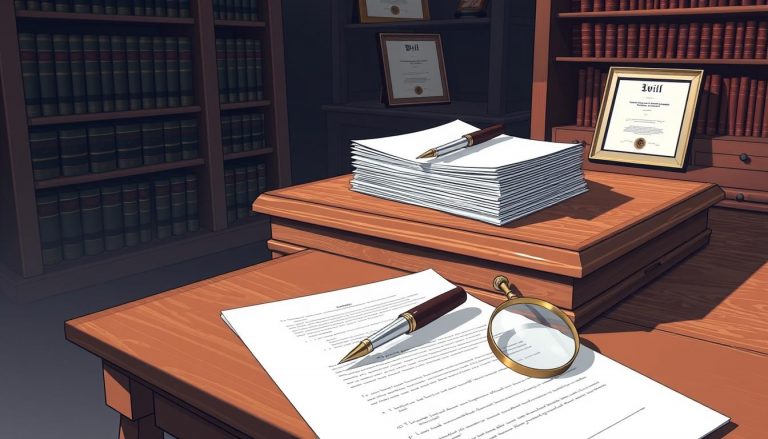Managing the estate of a deceased loved one can be a daunting task, especially during a difficult period. As outlined by Age UK, executor duties involve a myriad of tasks, including registering the death, arranging the funeral, and valuing the estate.
We understand that carrying out these responsibilities can be overwhelming. As experienced professionals, we guide you through the process, providing clarity on the duties and responsibilities involved in managing a will.
Key Takeaways
- Understanding the role and responsibilities of an executor
- Steps involved in managing a deceased person’s estate
- Valuing the estate and distributing assets according to the will
- Seeking professional guidance when needed
- Ensuring the deceased person’s wishes are respected
Understanding the Role of an Executor
The role of an executor is pivotal in ensuring that the deceased’s wishes are carried out as stated in their will. As experienced professionals, we understand the importance of this role and are here to guide you through the process.
What is an Executor?
An executor is an individual or institution appointed by the deceased to manage their estate after they pass away. According to Birketts, an executor is responsible for carrying out the instructions in the will and handling the estate, including tasks such as registering the death, arranging the funeral, and distributing the estate. This role requires a high level of responsibility and integrity, as the executor is essentially the bridge between the deceased’s wishes and the beneficiaries.
“The executor’s role is to act in the best interests of the estate and its beneficiaries, ensuring that the deceased’s wishes are respected and carried out,” as highlighted by legal experts. This involves a series of complex tasks that require careful management and attention to detail.
Key Responsibilities of an Executor
The duties of an executor are multifaceted and include several key responsibilities:
- Managing the estate’s assets, including property and financial accounts.
- Paying off debts and liabilities.
- Distributing the remaining assets according to the will.
- Handling tax obligations, including inheritance tax and capital gains tax.
Being an executor can be a challenging task, requiring a significant amount of time, effort, and expertise. It’s essential for executors to understand their responsibilities and seek professional advice when needed to ensure they are carrying out their duties effectively.

As we navigate the complexities of being an executor, it’s clear that this role is not just about following instructions but also about ensuring that the deceased’s legacy is managed with care and diligence. By understanding the duties and responsibilities involved, individuals can better prepare themselves for the challenges and rewards that come with being an executor.
Legal Requirements for Being an Executor
To act as an executor in the UK, one must meet specific legal criteria and gather necessary documents. Understanding these requirements is vital to ensure that the executor can carry out their duties effectively.
Eligibility Criteria
The eligibility criteria for being an executor are straightforward. According to UK law, an executor must be at least 18 years old and of sound mind. This means that the individual should not have any mental health issues that would prevent them from managing the estate effectively.
Key Eligibility Points:
- Must be 18 years or older
- Must be of sound mind
- Cannot be bankrupt (in some cases)
Necessary Documentation
To apply for probate, the executor must provide certain necessary documentation. This includes the original will and the death certificate. The UK Government requires these documents to verify the executor’s authority and to ensure that the estate is administered according to the deceased’s wishes.
Required Documents:
| Document | Purpose |
|---|---|
| Original Will | Outlines the deceased’s wishes regarding the distribution of their estate |
| Death Certificate | Confirms the death of the individual |
| Grant of Probate | Legal document that authorizes the executor to manage the estate |
It’s essential for executors to understand that the probate process involves legal and administrative tasks. Ensuring that all necessary documentation is in order will facilitate a smoother probate process.
The Process of Probate
The probate process is a critical step in managing the estate of a deceased individual, ensuring that their wishes are carried out as stated in their will. As executors, understanding this process is vital to fulfilling their duties effectively.
Probate Explained
Probate is the legal process of proving the validity of a will. It involves verifying that the will is genuine and that the deceased person had the mental capacity to make it. According to the UK Government, probate allows the executor to administer the estate, paying off debts and distributing assets to beneficiaries as instructed in the will.
“Probate is essential for ensuring that the deceased person’s estate is distributed according to their wishes, providing clarity and legal authority to the executor.”
Steps to Apply for Probate
Applying for probate involves several key steps:
- Gathering the necessary documentation, including the will and details of the deceased’s assets and liabilities.
- Completing the probate application form, which can be done online or through a paper application.
- Paying the required probate fees, which vary depending on the size of the estate.
- Submitting the application to the HM Courts & Tribunals Service.
To check if probate has been granted, executors can use the service provided by the UK government. More information on this process can be found on our page about how to find out if probate has been.
By understanding and following these steps, executors can ensure that they comply with the legal requirements, making the probate process as smooth as possible for all parties involved.
Managing the Estate
Managing the estate effectively is crucial for executors to carry out their duties successfully. As part of their executor responsibilities, they must ensure that all aspects of the estate are handled properly.
Inventory of Assets
Creating a comprehensive inventory of assets is the first step in managing the estate. This involves identifying and listing all the assets belonging to the deceased, including properties, bank accounts, investments, and personal belongings.
- Properties: residential and commercial
- Financial assets: bank accounts, stocks, bonds
- Personal belongings: jewelry, vehicles, artwork
Valuing the Estate
Once the inventory is complete, the next step is to value the estate. This requires determining the value of each asset as of the date of death. Professional valuations may be necessary for certain assets, such as property or valuable items.
| Asset Type | Valuation Method | Example |
|---|---|---|
| Real Estate | Professional appraisal | £250,000 |
| Investments | Market value at date of death | £50,000 |
| Jewelry | Professional valuation | £10,000 |
Settling Debts and Liabilities
After valuing the estate, executors must settle any debts and liabilities. This includes paying off outstanding bills, loans, and other financial obligations. It’s essential to prioritize these payments to avoid any legal issues.
According to Age UK, managing the estate involves creating an inventory of assets, valuing the estate, and settling debts and liabilities. By following these steps, executors can ensure that the estate is managed effectively.

Distributing the Estate
Distributing the estate is a pivotal task for executors, requiring careful adherence to the will’s instructions. This process involves not only following the legal requirements but also ensuring that the beneficiaries receive their inheritances as smoothly as possible.
Following the Will’s Instructions
The first step in distributing the estate is to carefully follow the instructions outlined in the will. This involves identifying the beneficiaries, understanding their inheritances, and ensuring that all assets are distributed accordingly. Executors must be meticulous in this process to avoid any potential disputes or legal issues.
Key steps to follow the will’s instructions include:
- Reviewing the will to understand the deceased’s wishes
- Identifying and gathering all relevant assets
- Distributing the assets according to the will
Handling Disputes among Beneficiaries
Despite the best efforts of executors, disputes among beneficiaries can arise. These disputes can be due to various reasons, such as misunderstandings about the will’s instructions or disagreements over the distribution of assets. Handling these disputes requires a combination of empathy, clear communication, and sometimes, professional mediation.
Effective strategies for handling disputes include:
- Maintaining open and transparent communication with all beneficiaries
- Seeking professional advice when necessary
- Ensuring that all actions are fair and in accordance with the will
By following the will’s instructions carefully and handling disputes effectively, executors can ensure that the estate is distributed in a manner that respects the deceased’s wishes and satisfies the beneficiaries.
Tax Responsibilities for Executors
Understanding the tax implications of estate administration is essential for executors to fulfill their duties effectively. As stated by the UK Government, executors are responsible for managing the tax liabilities of the estate, including inheritance tax and capital gains tax.
Inheritance Tax Explained
Inheritance tax is a tax on the estate of someone who has passed away. The standard inheritance tax rate is 40% on assets above the £325,000 threshold. However, there are certain exemptions and reliefs available, such as the residence nil-rate band, which can reduce the taxable amount.
Executors must file an inheritance tax return with HMRC, detailing the value of the estate and calculating the tax due. It’s crucial to understand that inheritance tax is typically paid out of the estate before distribution to beneficiaries.
Key points to consider:
- The inheritance tax threshold is £325,000, with an additional £175,000 residence nil-rate band if certain conditions are met.
- Gifts given within seven years before the deceased’s passing may be subject to inheritance tax.
- Executors must report the estate’s value to HMRC using the appropriate forms.
Managing Capital Gains Tax
Capital gains tax is another important consideration for executors. It is charged on the gain made from selling or disposing of assets that have increased in value. The tax rate depends on the type of asset and the beneficiary’s tax status.
Executors should be aware that the deceased’s assets are revalued to their market value at the date of death, potentially reducing capital gains tax liability when assets are sold.
“Executors need to carefully manage capital gains tax to minimize the tax burden on the estate and its beneficiaries.” – HMRC Guidelines
To manage capital gains tax effectively, executors should:
- Identify assets that have increased in value and consider the tax implications of selling these assets.
- Utilize the annual capital gains tax allowance if possible.
- Consider transferring assets to beneficiaries rather than selling them, to minimize capital gains tax.
By understanding and managing these tax responsibilities, executors can ensure compliance with tax laws and minimize the tax burden on the estate.
Executor Fees and Compensation
As an executor, you’re not only responsible for managing the estate but also entitled to compensation for your efforts. This aspect of the role is often overlooked, but it’s crucial for ensuring that executors are fairly reimbursed for their time and expenses.
Understanding Executor Fees
Executor fees are payments made to the executor for their work in managing the estate. These fees can vary depending on the complexity of the estate, the time involved, and the fees agreed upon in the will or by the executors. According to Age UK, executors may be entitled to claim fees and compensation for their work in managing the estate.
The fees can be structured in various ways, including:
- A percentage of the estate’s value
- An hourly rate for the time spent on estate administration
- A fixed fee agreed upon by the executors and the beneficiaries
It’s essential to keep detailed records of the time spent and expenses incurred while managing the estate to justify the fees claimed.
How to Claim Compensation
Claiming compensation as an executor involves several steps:
- Document everything: Keep a detailed record of all tasks performed, time spent, and expenses incurred.
- Check the will: Review the will to see if it specifies how executor fees should be handled.
- Consult with professionals: Seek advice from a solicitor or an accountant to ensure you’re following the correct procedures.
- Obtain beneficiary agreement: In some cases, you may need to get agreement from the beneficiaries on the fees you’re claiming.
By following these steps, you can ensure that you’re fairly compensated for your role as an executor.
Challenges Executors May Face
Executors may face several challenges, including difficult beneficiaries and process delays. Being an executor of a will is a significant responsibility, and understanding the duties of an executor is crucial to navigating these challenges effectively.
Dealing with Difficult Beneficiaries
Beneficiaries may have different expectations or interpretations of the will, leading to potential conflicts. As an executor, it’s essential to remain impartial and communicate clearly with all parties involved.
Some common issues that may arise include:
- Disagreements over the distribution of assets
- Misunderstandings about the will’s instructions
- Unrealistic expectations from beneficiaries
To manage these situations effectively, executors should:
- Maintain open and transparent communication
- Provide regular updates on the estate’s administration
- Seek professional advice when necessary
Handling Delays in the Process
Delays can occur due to various factors, including incomplete or inaccurate documentation, disputes among beneficiaries, or unforeseen circumstances. Executors must be prepared to handle these delays and take steps to mitigate their impact.
Some strategies for managing delays include:
- Identifying potential bottlenecks early on
- Prioritizing tasks and managing the estate’s administration efficiently
- Seeking professional assistance to navigate complex issues
According to Birketts, executors may face challenges, including dealing with difficult beneficiaries and handling delays in the process. By understanding these potential challenges, executors can better prepare themselves for the complexities of their role.
| Challenge | Potential Solution |
|---|---|
| Difficult Beneficiaries | Maintain open communication, provide regular updates |
| Delays in the Process | Identify potential bottlenecks, prioritize tasks, seek professional assistance |
By being aware of the potential challenges and taking proactive steps, executors can effectively manage the estate and fulfill their duties as outlined in the will.
Resources and Support for Executors
As an executor, managing a will can be a complex and challenging task. Fortunately, there are various resources available to provide guidance and support. Understanding how to be an executor and fulfilling executor responsibilities can be made easier with the right help.
Seeking Professional Advice
Executors can seek professional advice from solicitors specializing in probate law. According to Age UK, seeking professional advice can help ensure that executor responsibilities are carried out correctly. These experts can provide valuable guidance on managing the estate, dealing with tax implications, and distributing assets according to the will.
Utilizing Helpful Organisations and Websites
There are several organisations and websites that offer support and resources for executors. These include the UK Government’s website, which provides information on the probate process, and charities like Age UK, which offer guidance on managing estates. By leveraging these resources, executors can better understand their role and how to be an executor effectively.


